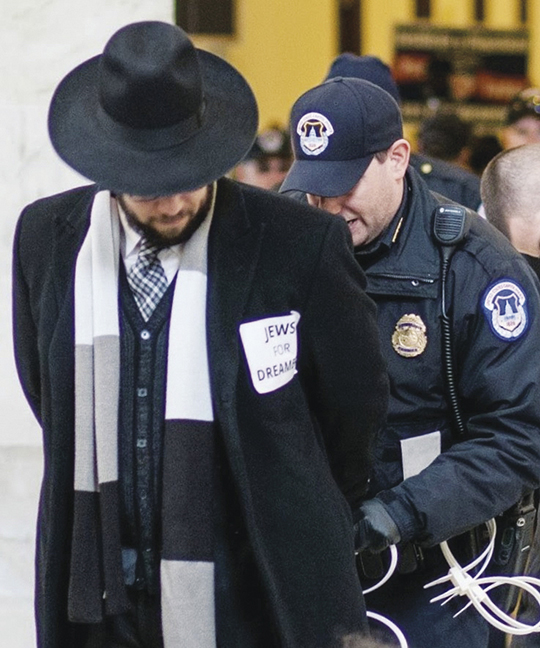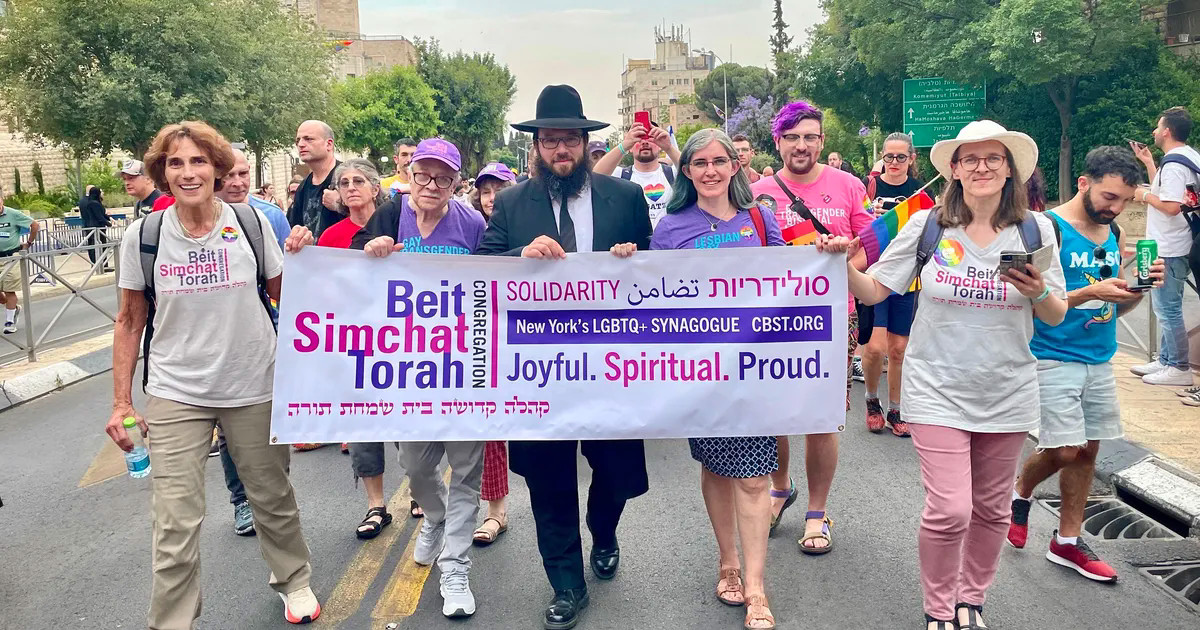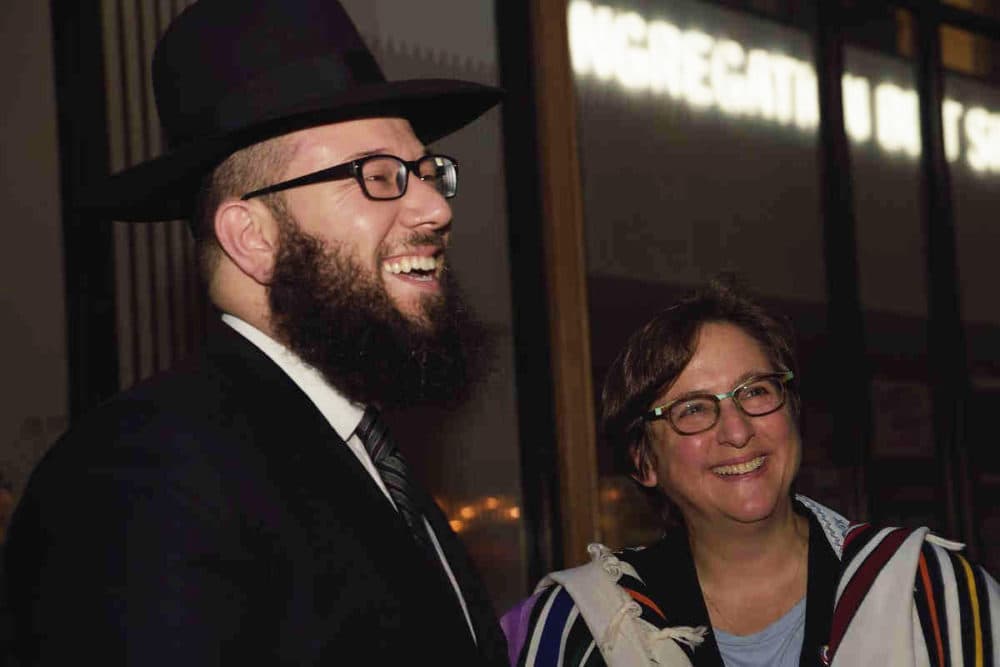Rabbi Mike Moskowitz, a cisgender, heterosexual rabbi with three rabbinic ordinations from the Ultra-Orthodox world, has made an incredible impact upon trans acceptance within Orthodox Jewish practice. To borrow language from the queer experience, Rabbi Moskowitz describes his religious journey as, “I was assigned secular at birth, came out and identified as ultra-orthodox, and now I’m some version of religious non-conforming.” In Moskowitz’ words, “Orthodox Judaism is an incredibly gender-based spiritual practice,” with one’s gender determining where one sits in synagogue, how one participates in synagogue, and what commandments they are obligated in. What should one do when one feels they must cross the binary of practice or otherwise live outside of it, while remaining faithful to orthodox tradition? Rabbi Moskowitz has been a consistent, persistent go-to rabbinic authority for the many communities and families that rely on his leadership, and he has seen the opportunities for observant, trans Jews widen astonishingly within the last decade.
Moskowitz was born in 1979, and raised in Richmond, Virginia by a family of the Conservative Jewish movement. His family was well-educated, fairly integrated into secular American culture. From the time that he could remember, Moskowitz felt that he was not a good fit for this world. Being unusually perceptive, he had been noticing the pain and suffering of those around him since he was very little. For all of the world’s miseries, he never understood how its pleasures were worth it. Throughout adolescence, he was persistently asking “Why are we here? Why is humanity worth it? Why are we alive?” This disillusionment and questioning still guide the way that he processes world events today.
In middle school and high school, he got exposed to philosophy, theology, and the Jewish texts that explored these themes. From the biblical creation story, he understood that this world— the one of suffering— was not the one God originally intended. He had placed humans in a garden of paradise, and it was through error that we were banished. This framing made a lot of sense to him, and he began to see his life’s mission as to return, in any small way, to the garden, to help alleviate suffering wherever he could. He spent his youth consciously fighting against distractions to that mission. Soccer practice and other sports were expected of him, while all he really wanted was the time alone to think about these issues. While he knew he didn’t have the power to change anything then, he would make mental notes for his future self.
Moskowitz's mother had raised the family with an unwavering awareness of the divine presence. If someone was lying, they understood that God knew who’s telling the truth. Throughout all of his questioning of the purpose of a world of tragedy and suffering, he had never questioned God’s existence itself. Instead he was asking how there could be a God that would create a world that was so messed up. Moskowitz’s earliest memories involve a feeling that God was present for him imminently. While he sometimes felt lonely in human spaces, not quite fitting in, he always had a sense of being accompanied and watched over by the Divine. This is an awareness he tries to pass on to his kids today.
His family observed many Jewish holidays and rituals, yet their commitment was not consistent. For example, if soccer practice conflicted with Saturday morning services, they did not attend synagogue until the next season. During his teen years, he began rebelling further against the typical things that his peers cared about, searching for something that would make life make a little more sense. He began growing out his hair, seeking to be deliberately counter-cultural in his presentation. He was signaling to the world that he did not buy into the trivial pursuits of mainstream secular culture. Neither competition in school nor sports would bring him personal fulfillment. He tried to surround himself with thinking people with whom he could find a shared understanding of the messed-up structure of the world. When he started dating a non-Jewish girl, his grandparents enrolled him in USY— a Jewish youth group in the Conservative movement that would eventually inspire a committed shift into Orthodoxy.
At seventeen, having rejected so much of society’s offerings for how to live his life, exposure to Orthodox thought attracted him without much competition. At a USY program, young Moskowitz was bored by the lesson content and perusing the back of his prayerbook where he found the ancient Jewish compendium that would clarify the trajectory of his thoughts. It was Pirkei Avot, Ethics of our Ancestors, which is filled with statements about humanity’s purpose, why they were placed on earth, and how one should act interpersonally in this world— that is, prioritizing the well-being of others. Once he discovered this ancient wisdom, his thought process was simple: If there’s a God that is calling me to make the world better, who am I to say that I’m too busy? From that moment, he made a beeline straight into Orthodox practice. He began to consume as much information as possible about traditional Judaism and texts, and integrate his growing knowledge into daily practice. He felt drawn towards its simplicity, its predetermined set of expectations and endless structure for how to wake up, eat, pray, act, and sleep. As he did back then, Rabbi Moskowitz continues to find Orthodox practice a meaningful structure for his life today.
In a hurry to go to yeshiva, he graduated high school a year early, in 1998. He went to study at a program of Ohr Sameach designed for religiously-motivated men from a limited Orthodox background, called Derech (the way). He was the first member of his family in three generations not to go to a traditional college. He had a fantastic experience— it was everything he ever wanted. He made close friends there, who were focused on helping each other, developing themselves, and trying to learn as much as possible. He studied there for a year and a half, and then transferred to the Mir in Jerusalem, the world’s largest yeshiva. On the city streets outside the Mir, you can hear the cacophony of Torah study from a block away. He did well in that world: he felt safe and seen and whole. His time at yeshiva was a deeply healing experience. He was still questioning what kind of contribution he wanted to make in the world, but it was clear to him that he had found where he had belonged.
The anxiety of being truthful about one’s identity, Moskowitz could relate to. It was not common for people in an Ultra-Orthodox setting to come from a non-Orthodox background. He found himself concealing the specifics of his personal history, protecting himself from the uncomfortable reactions of others. He realized that some of his peers had no framework for understanding his religiosity. These experiences gave him an appreciation for true difference— a crystallized and heightened awareness that everyone carries different stories and a need to be truly seen and understood.
At age 22, he received his first smicha (rabbinic ordination). He got married at 23 to a 20-year-old girl from an Ultra-Orthodox background, ages that were typical within the community. From 1998 - 2009, Rabbi Moskowitz would be studying full-time in yeshiva, both in Israel and the U.S. The couple moved back to the U.S. once they had a child to be closer to his then-wife’s family. Moskowitz continued studying Talmud and practical halacha (Jewish Law) in the prominent Jewish community of Lakewood, New Jersey, where he stayed for four years and received his second ordination in the laws of family purity. He then spent several years back in Richmond, his home town, teaching and learning in a high school beis medrish (house of study).
As the years passed, someone in his family came out as trans, and someone else as a lesbian. It affected his family structure. He understood that he was faced with the choice of being either supportive or not supportive, and he chose the former. Since people had known of his positive stance towards his trans family member, others began to come out to him. This began the next big chunk of his life, where he remains now at age 44, focused on impacting traditional spaces in the Orthodox and hareidi (Ultra-Orthodox) world, and more broadly, interfaith and interdenominational spaces around trans and queer issues.
In 2014, he came to New York and took his first pulpit position at Old Broadway synagogue in Harlem while simultaneously working with Columbia University students as a rabbi through the Orthodox outreach organization Aish HaTorah. A couple years later, a trans congregant at Old Broadway took a risk and came out to him, opening up about his experiences in life and navigating the orthodox world as a trans person. This congregant was tremendously helpful in raising Moskowitz’ awareness of points of anxiety for trans people, which he never would have guessed on his own.
At the time, Rabbi Moskowitz was writing blog posts for Keshet, a Jewish LGBTQ organization, under the pseudonym “kol rei chaim.” He was anonymously writing letters to Jewish day schools that were threatening to expel trans students, and one of these letters went viral, with tens of thousands of shares. This became a turning point. He was trying so hard to make change by working within the system, but it became clear to him that the voice that was necessary was the outside voice— the one of critique. At age 37, Rabbi Moskowitz had the same feeling of clarity he had felt when he was choosing to become observant at 17: a clear sense of wrong and right, and the simplicity of his obligation to create a better world. During Chanukah of 2016, he delivered a sermon to his congregants urging them to overcome fear, hatred, and discrimination— the first time he went public with his supportive stance towards LGBTQ Jews.
The communal reaction to his sermon was really difficult. He got fired from the congregation, and lost his second job at Aish very shortly after. His sermon drew much backlash and attention from Jewish media. The rabbi who gave R’ Moskowitz’ first ordination published a scathing letter against him, while other beloved teachers and friends stopped returning his calls. While he was accomplished as a rabbi with three total ordinations, no one would hire him. He found random gigs and ended up managing a deli back in Lakewood, New Jersey. This part of his life was incredibly difficult, and he would sometimes think to himself that the best was behind him, and he ought to find a different career. But he continued writing articles from the deli counter, this time publishing under his real name.
 Rabbi Moskowitz arrested at DACA protest, January 2018His fate changed in January 2018, when he took a day off to join a protest in D.C. against negative treatment of DACA recipients and other immigrants. In an act of civil disobedience, he got arrested with a bunch of other rabbis, including R’ Sharon Kleinbaum, the rabbi of New York’s first explicitly queer synagogue Congregation Beth Simchat Torah (CBST). Handcuffed in the back of the police wagon, one rabbi asks, “Does anyone have any Torah to share?” R’ Moskowitz had just written an article about gender and biblical support for trans identity, and so he spoke up. Moskowitz later mused, “Everyone in handcuffs— it was a captive audience! Every rabbi’s dream.” Kleinbaum was shocked: from her decades of working as a rabbi, she had never expected to see a straight, cis, Yeshivish-looking (Ultra-Orthodox) man sharing some trans-supportive Torah. What he said was different than what she was used to, and it resonated with her. In the back of the van, she offered him a job as a scholar-in-residence at CBST.
Rabbi Moskowitz arrested at DACA protest, January 2018His fate changed in January 2018, when he took a day off to join a protest in D.C. against negative treatment of DACA recipients and other immigrants. In an act of civil disobedience, he got arrested with a bunch of other rabbis, including R’ Sharon Kleinbaum, the rabbi of New York’s first explicitly queer synagogue Congregation Beth Simchat Torah (CBST). Handcuffed in the back of the police wagon, one rabbi asks, “Does anyone have any Torah to share?” R’ Moskowitz had just written an article about gender and biblical support for trans identity, and so he spoke up. Moskowitz later mused, “Everyone in handcuffs— it was a captive audience! Every rabbi’s dream.” Kleinbaum was shocked: from her decades of working as a rabbi, she had never expected to see a straight, cis, Yeshivish-looking (Ultra-Orthodox) man sharing some trans-supportive Torah. What he said was different than what she was used to, and it resonated with her. In the back of the van, she offered him a job as a scholar-in-residence at CBST.
 Rabbi Moskowitz marching with CBST in the Jerusalem Pride March, June 1st 2023
Rabbi Moskowitz marching with CBST in the Jerusalem Pride March, June 1st 2023
 Rabbi Moskowitz pictured with Rabbi Sharon Kleinbaum, 2019His accepting the job at CBST, however, caused another ripple amongst the Orthodox rabbinate. After getting his third rabbinic ordination in 2014, he joined the Rabbinic Council of America (RCA)— one of the world’s largest and most important organizations of Orthodox rabbis. A few days after he started at CBST on May 1st, 2018, he received a call from Israel from the head of the RCA. He said something like, ‘Right now half of RCA is in support of you, and the other half is in opposition. If you remain in the RCA, then the half that is in opposition might break away, while the half that supports you won’t care. You are free to resign.’ After a back-and-forth, the head of the RCA proposed that if Moskowitz resigned from the RCA, then he would agree to meet with him and help advance the cause. Rabbi Moskowitz accepted, and commented that indeed they had met a couple times afterwards, and progress has been made.
Rabbi Moskowitz pictured with Rabbi Sharon Kleinbaum, 2019His accepting the job at CBST, however, caused another ripple amongst the Orthodox rabbinate. After getting his third rabbinic ordination in 2014, he joined the Rabbinic Council of America (RCA)— one of the world’s largest and most important organizations of Orthodox rabbis. A few days after he started at CBST on May 1st, 2018, he received a call from Israel from the head of the RCA. He said something like, ‘Right now half of RCA is in support of you, and the other half is in opposition. If you remain in the RCA, then the half that is in opposition might break away, while the half that supports you won’t care. You are free to resign.’ After a back-and-forth, the head of the RCA proposed that if Moskowitz resigned from the RCA, then he would agree to meet with him and help advance the cause. Rabbi Moskowitz accepted, and commented that indeed they had met a couple times afterwards, and progress has been made.
As of January 2024, R’ Moskowitz remains on staff at CBST, having close to six fruitful years with them. His tenure allows him the time to articulate a theology that accounts for trans and queer people, from within the Torah and within Jewish tradition. With the shul’s support, he has published 5 books and over 200 articles, creating resources that have been used all over the world. He speaks and teaches about trans inclusion to congregations, colleges, day schools, Jewish community centers, interfaith events, and academic conferences. While he still receives much hate mail and negativity, every day he receives calls and offers guidance to Orthodox and Ultra-Orthodox rabbis and families with trans congregants and family members. Moskowitz has been amazed to see that each year it gets better, with more and more people remaining within the orthodox world, no longer forced to choose between their core religious and queer identities. The limits of his work has expanded from merely helping people process their own internalized shame, to helping entire communities not just accept but celebrate their queer congregants and their marriages, as well as equipping Orthodox schools with the resources to support LGBTQ children and parents.
Rabbi Mike Moskowitz lives with his wife Rabbah Wendy Amsellem whom he married in 2020, and has four children. He is a Rabbinic Fellow of the David Hartman Center, a Wexner Field Fellow, Co-founder of Bayit, formerly senior educator at Orthodox social justice organization Uri L’Tzedek, and in 2020 received the Landres Courage for Dignity Award.
(This biographical statement was written by Charlie Feuerman from an interview with Mike Moskowitz and from the sources below and was edited by Moskowitz.)
Biography Date: June 2024